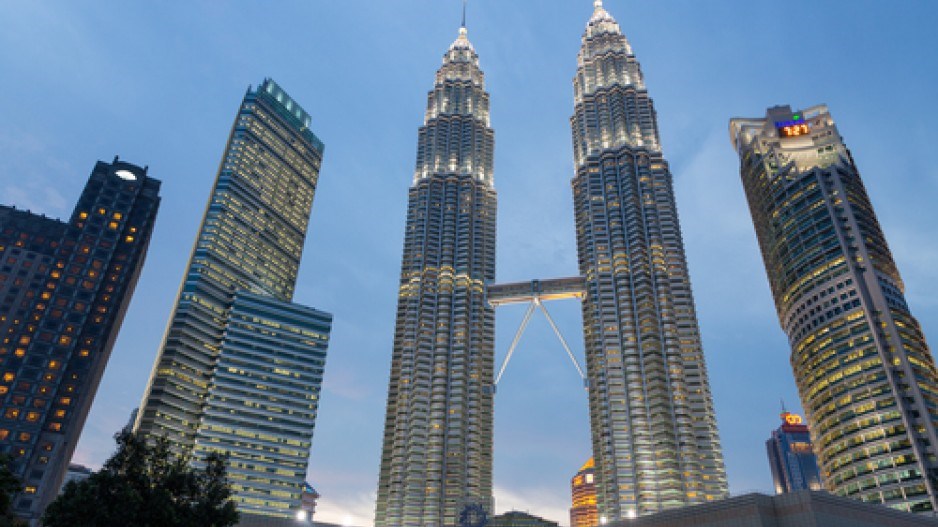In 2012, Petronas, the Malaysian national oil company, featured prominently in the B.C. oil and gas landscape.
Petronas' takeover of Progress Energy Resources Corp. with a price tag of $5.2 billion and the saga with Industry Canada involving a rejection of the transaction delivered minutes before midnight, followed by eventual approval, generated much interest.
Inevitably, the owner-country Malaysia shared some of the spotlight. This has triggered fresh interest in Malaysia in other sectors.
Malaysia is no stranger to Canada.
When Malaysia gained independence in 1957, Canada was among the first countries to establish a diplomatic relationship.
Since then, the two nations and their people have developed mutual relations on many fronts – political, economic, trade, social and cultural.
Fast-forward to the present era, according to data provided by the Government of Canada, Canadian exports to Malaysia for 2012 were $783 million while Canadian imports from Malaysia were $2.2 billion.
There remains tremendous potential to build bridges between the two countries.
Malaysia is a federal constitutional monarchy, and the system of government reflects closely the Westminster parliamentary system, a heritage of British colonial rule.
The legal system is based on English common law. Canadians will not find it daunting to relate to the political and legal regime in Malaysia.
The official language is Bahasa Malaysia (the Malay language).
English, however, remains an active second language, almost a de facto commercial language in private dealings.
Canada is represented in Malaysia by the High Commission in Kuala Lumpur and a consulate in Penang.
The Canadian Trade Commissioner Service actively assists Canadian companies with interest in Malaysia and provides them with on the ground intelligence and practical advice.
Another great point of contact is the Malaysia Canada Business Council in Kuala Lumpur. MCBC-KL is a private non-profit organisation that provides a forum for businesses with Canadian connections and those interested in doing business with Canada.
If local business councils serve as a barometer to gauge inter-nation members' involvement and interest, MCBC-KL's track record shows strong Canadian-related activities in Malaysia.
The board of MCBC envisages a rapid increase in the level of interaction and MCBC has recently implemented an expansion program that includes relocating to a spacious office in the city centre aptly named Canada Place.
Other sources of information closer to home include the Malaysian High Commission in Ottawa, the consulate in Vancouver and the Malaysian Trade Commissioner based in Toronto.
Hence, for B.C. businesses interested in exploring possibilities in Malaysia, there are ready connections to provide assistance.
And they will be in good company.
A quick check on the who's who list of Canadians in Malaysia reveals an impressive lineup. TSX-listed corporations such as the Scotiabank, Talisman, SNC Lavalin, Bombardier and Manulife have operations in Malaysia.
Other private investors such as Vancouver-based Vision Investment Properties have similarly found Malaysia a good place to establish their presence.
In 2012, the World Bank's ranking of economies for overall "ease of doing business" places Malaysia No. 12 out of 185 economies.
The country's robust economy, skilled and educated workforce, business-friendly legal framework and developed infrastructure beckon international investors.
Malaysia also works hard to evolve, innovate and embrace new frontiers.
A good example is the Federal Territory of Labuan, which was established in 1990 to become a premier international business and financial centre (IBFC) in the Asia Pacific region.
To retain its competitive edge, a review of the entire legal structure supporting Labuan IBFC was conducted in 2010, leading to the expansion of its product offerings both for international corporations and high-net-worth individuals, including protected cell companies, foundations, Labuan special trusts, private trust companies and international shipping registry.
Have a closer look at Malaysia. For business interests, one may take a cue from the Canadian trade commissioner's knowledge of the market in Malaysia.
The following sectors have been listed as offering the greatest opportunities for Canadian companies: agriculture, food and beverages, information and communications technologies, oil and gas equipment and services, and service industries and capital projects.
For those who like to mix business and pleasure, Malaysia is also a synonym for lush rain forest, sparkling sandy beaches, multiculturalism, world-class golf and great dive sites. •




